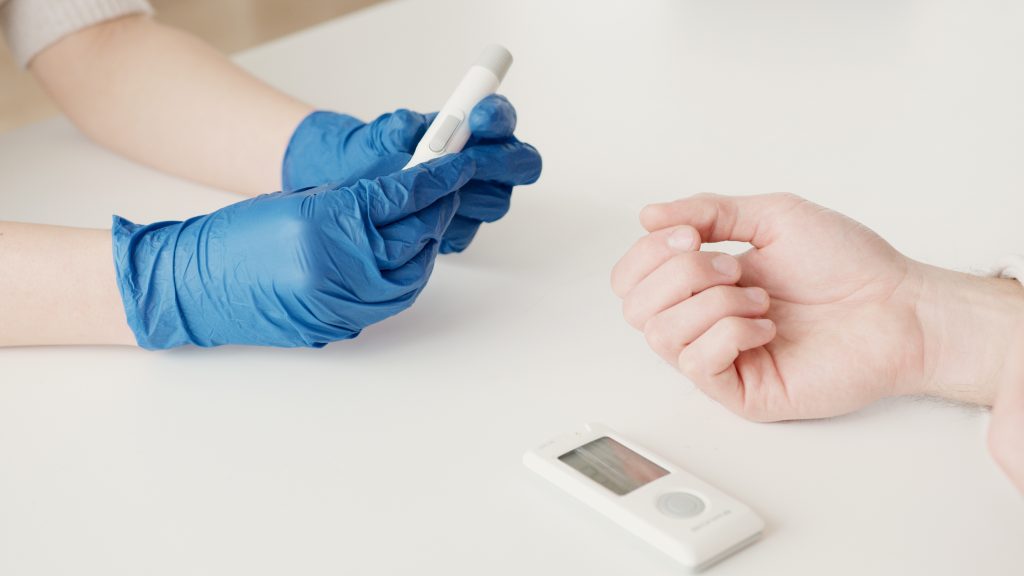Discover how practicing mindfulness can positively impact individuals with diabetes.
Exploring the Benefits of Mindfulness for Diabetes

Living with diabetes can be a challenge, but what if there was a way to make it a little bit easier? Enter mindfulness – a powerful practice that has been gaining popularity in recent years. In this article, we will delve into the world of mindfulness and explore how it can benefit those living with diabetes. So, sit back, relax, and let’s embark on this enlightening journey together!
Understanding Mindfulness
Before we dive into the wonderful world of mindfulness, it’s important to understand what it actually is. Mindfulness is all about being present in the moment and fully aware of your thoughts, feelings, and sensations. It’s like hitting the pause button on your frantic thoughts and embracing the here and now. Sounds pretty magical, right?
But let’s delve a little deeper into the concept of mindfulness. At its core, mindfulness is about observing your thoughts without judgment. It’s about redirecting your attention to the present moment, rather than dwelling on the past or worrying about the future. By doing this, you can cultivate a sense of inner peace and tranquility.
Imagine this: you’re sitting in a park, surrounded by the gentle rustling of leaves and the soft chirping of birds. Your mind starts to wander, replaying past events or worrying about what’s to come. But then, you remember to be mindful. You take a deep breath and bring your attention back to the present moment. Suddenly, you notice the vibrant colors of the flowers around you, the warmth of the sun on your skin, and the gentle breeze caressing your face. In that moment, you are fully present, fully alive.
The Science Behind Mindfulness
So, you might be thinking, “Is there any scientific evidence to back up this mindfulness stuff?” The answer is a resounding yes! Research has shown that mindfulness practices can have a profound impact on both our physical and mental well-being.
Let’s start with the physical benefits. Mindfulness has been found to reduce stress levels by activating the body’s relaxation response. When we are stressed, our bodies release stress hormones like cortisol, which can have detrimental effects on our health. However, practicing mindfulness can help lower cortisol levels, leading to a calmer and more relaxed state of being.
But the benefits don’t stop there. Mindfulness has also been shown to improve immune function, lower blood pressure, and even reduce chronic pain. By bringing our attention to the present moment and cultivating a state of relaxation, we can support our body’s natural healing processes and promote overall well-being.
Now, let’s talk about the mental benefits of mindfulness. Research has found that regular mindfulness practice can reduce symptoms of anxiety and depression. By observing our thoughts without judgment, we can create distance from negative or intrusive thinking patterns, allowing us to experience a greater sense of peace and clarity.
Furthermore, mindfulness has been shown to enhance cognitive function. When we are fully present and focused, our ability to concentrate and retain information improves. This can be particularly beneficial for students or anyone looking to enhance their productivity and performance.
Lastly, mindfulness can help us develop a deeper sense of self-awareness and emotional intelligence. By paying attention to our thoughts, feelings, and sensations in the present moment, we can gain insight into our patterns of behavior and better understand ourselves. This self-awareness can lead to greater self-acceptance and a more authentic way of living.
So, as you can see, there is a wealth of scientific evidence supporting the benefits of mindfulness. It’s not just some New Age fad; it’s a powerful tool for improving our overall well-being. Whether you’re looking to reduce stress, enhance focus, or simply live a more fulfilling life, mindfulness can be a valuable practice to incorporate into your daily routine.
The Connection Between Mindfulness and Diabetes
Now that we have a better understanding of mindfulness, let’s delve into how it relates to diabetes. You might be surprised to learn that practicing mindfulness can actually have a positive effect on blood sugar levels and diabetes management. Pretty impressive, right?
But what exactly is mindfulness? Mindfulness is the practice of being fully present and aware of our thoughts, feelings, and sensations in the present moment. It involves paying attention to our experiences without judgment or attachment. By cultivating mindfulness, we can develop a greater sense of self-awareness and a deeper connection with our bodies.
How Mindfulness Affects Blood Sugar Levels
When we’re stressed, our bodies release stress hormones, which can cause our blood sugar levels to soar. This can be particularly problematic for individuals with diabetes, as high blood sugar levels can lead to a range of complications. But fear not, because mindfulness has the power to combat this.
By practicing mindfulness techniques, such as deep breathing and meditation, we can reduce stress levels and, in turn, keep our blood sugar levels in check. Deep breathing exercises help activate the body’s relaxation response, which counteracts the effects of stress hormones. Meditation, on the other hand, allows us to observe our thoughts and emotions without getting caught up in them. This can help us develop a more balanced and calm mindset, which can positively impact our blood sugar levels.
Furthermore, mindfulness can also improve our eating habits. When we eat mindfully, we pay attention to the taste, texture, and smell of our food. We savor each bite and eat slowly, allowing our bodies to properly digest and absorb the nutrients. This can prevent overeating and help us make healthier food choices, which can contribute to better blood sugar control.
Mindfulness and Diabetes Management
Diabetes management can sometimes feel like a never-ending battle, but mindfulness can be a powerful tool in your arsenal. By increasing your self-awareness and focusing on the present moment, you can make more informed choices about your diet, exercise, and medication.
When we practice mindfulness, we become more attuned to our body’s signals and cues. We can better recognize when we’re hungry or full, allowing us to eat in a way that supports our blood sugar management. Mindfulness can also help us become more aware of how different foods affect our bodies, enabling us to make more informed choices about what we eat.
In addition, mindfulness can enhance our exercise routine. By being fully present during physical activity, we can tune into our body’s sensations and adjust our movements accordingly. This can help us exercise safely and effectively, without putting unnecessary strain on our bodies.
Lastly, mindfulness can improve our medication adherence. By being present and focused, we are less likely to forget to take our medications or miss important appointments with healthcare providers. This can contribute to better overall diabetes management and reduce the risk of complications.
So, if you’re looking for a holistic approach to managing your diabetes, consider incorporating mindfulness into your daily routine. With its ability to reduce stress, improve eating habits, enhance exercise, and promote medication adherence, mindfulness can be a valuable ally in your journey towards better health.
The Benefits of Mindfulness for Diabetes Patients
So, we’ve established that mindfulness can have a positive impact on blood sugar levels and diabetes management, but what other benefits does it bring to the table? Brace yourself, because the list is rather impressive!
Stress Reduction and Diabetes Control
Living with diabetes can be stressful, but mindfulness can help alleviate some of that burden. By practicing mindfulness, you can reduce stress levels, improve your mood, and enhance your overall well-being. Who wouldn’t want that?
Imagine waking up in the morning and starting your day with a few minutes of mindful breathing. As you inhale deeply, you feel the tension in your body slowly melting away. With each exhale, you release the worries and anxieties that come with managing diabetes. This simple act of mindfulness sets the tone for the rest of your day, allowing you to approach challenges with a calm and centered mindset.
Research has shown that stress can have a detrimental effect on blood sugar control in individuals with diabetes. By incorporating mindfulness into your daily routine, you can effectively manage stress and improve your diabetes control. Mindfulness techniques such as meditation, deep breathing, and body scans can help you become more aware of your body’s signals and respond to them in a healthy and balanced way.
Mindfulness and Improved Quality of Life
Diabetes shouldn’t have to put a damper on your quality of life, and with mindfulness, it doesn’t have to. By embracing mindfulness practices, you can cultivate a greater sense of happiness, acceptance, and gratitude. It’s like finding a little ray of sunshine amidst the stormy clouds.
Picture yourself sitting in a peaceful garden, surrounded by the beauty of nature. As you close your eyes and focus on your breath, you become aware of the present moment. The worries about your diabetes fade into the background as you fully immerse yourself in the serenity of the present moment. This sense of mindfulness allows you to appreciate the simple joys in life and find contentment, despite the challenges that diabetes may bring.
Studies have shown that practicing mindfulness can lead to improvements in overall well-being and quality of life for individuals with chronic conditions, including diabetes. By cultivating a non-judgmental attitude towards yourself and your diabetes, you can develop a greater sense of self-compassion and acceptance. This can help you navigate the ups and downs of diabetes with resilience and grace.
Implementing Mindfulness Practices for Diabetes
Now that we’ve explored the benefits of mindfulness for diabetes, you might be wondering how to incorporate it into your daily routine. Fear not, because we’ve got you covered!

Mindfulness Techniques for Diabetes Patients
From deep breathing exercises to body scans and mindful eating, there are numerous techniques you can explore to integrate mindfulness into your life. Experiment with different practices and find what works best for you. It’s all about finding your own personal Zen!
Creating a Mindfulness Routine
Consistency is key when it comes to mindfulness. Set aside dedicated time each day to practice mindfulness, whether it’s first thing in the morning or before bedtime. Be patient with yourself and allow the practice to unfold naturally. Remember, it’s called a practice for a reason!
The Future of Mindfulness and Diabetes Treatment
As the saying goes, “The only constant in life is change,” and this certainly rings true for the world of mindfulness and diabetes treatment. Let’s take a sneak peek into what the future might hold!
Current Research on Mindfulness and Diabetes
Researchers are constantly exploring the potential benefits of mindfulness for diabetes patients. From studies on the impact of mindfulness on glycemic control to investigations into the role of mindfulness in preventing diabetes-related complications, exciting advancements are being made. It’s an exciting time to be a diabetes warrior!
Potential Developments in Mindfulness-Based Diabetes Care
The future holds endless possibilities when it comes to mindfulness-based diabetes care. From smartphone apps that offer guided mindfulness meditations to virtual reality experiences that transport you to a state of zen, the possibilities are truly mind-boggling. Who knows what innovative developments lie ahead?
So, there you have it – a deep dive into the marvelous world of mindfulness and its benefits for those living with diabetes. From stress reduction and improved diabetes management to enhanced overall well-being, mindfulness has the power to transform your diabetes journey. So, why not give it a try? Embrace the present moment, cultivate a sense of inner peace, and let mindfulness guide you on your path to a happier, healthier life with diabetes.







